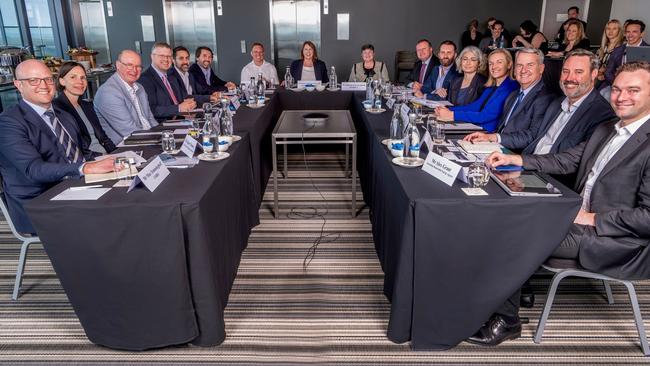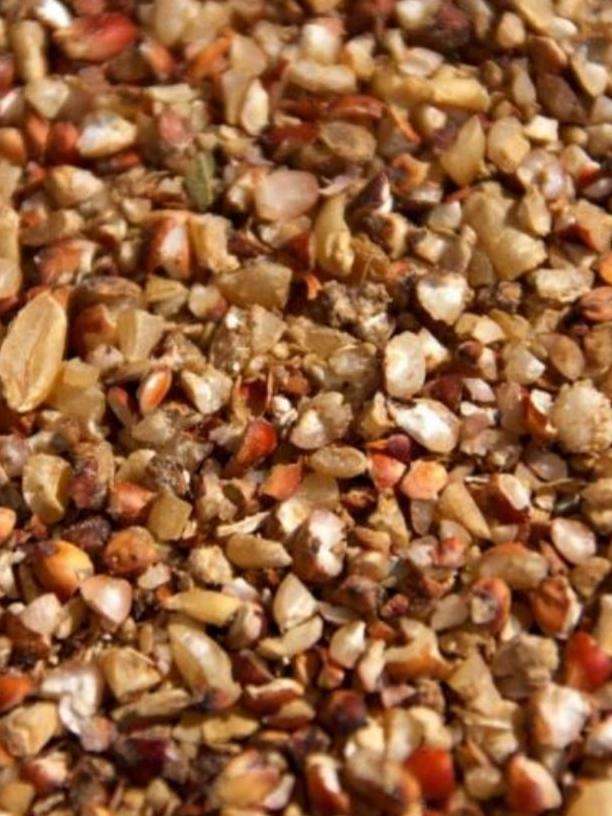Green jet fuel looming as a ‘missed opportunity’ condemning travellers to even higher fares
Australia is at risk of missing out on establishing a sustainable aviation fuel industry, condemning travellers to even higher airfares, the aviation industry fears.

Business
Don't miss out on the headlines from Business. Followed categories will be added to My News.
As 2023 draws to a close, there are growing fears within the aviation industry Australia risks missing the opportunity to produce its own sustainable aviation fuel, forcing higher costs on airlines and, in turn, travellers.
High-quality agricultural waste needed for the production of SAF is increasingly going offshore and there is no policy framework to support a SAF industry.
The much-anticipated Jet Zero Council, chaired by Transport Minister Catherine King, has only met once and then only for two hours.
Airbus Australia chief representative Stephen Forshaw said there was a growing sense of urgency among airlines, airports and manufacturers as time passed without progress.
“Everyone knows this is not a case of this is optional,” said Mr Forshaw.
“We don’t have other options so the use of SAF is going to be the biggest opportunity to drive decarbonisation.”
Adding to the problem was the scale of the need in Australia.
As one of the top-10 biggest users of aviation fuel worldwide, Australia burned through about 9.2 billion litres a year – a figure set to hit 10 billion litres by 2030.
In contrast just 300 million litres of SAF was produced worldwide last year, or less than 0.1 per cent of the global jet fuel needs.
“We are no small player when it comes to the demand for aviation fuel and we should be taking a very meaningful and thoughtful approach to how we play on shore with the development and production of SAF here in Australia,” Mr Forshaw said.
Front of mind for the Airbus executive was the increasing global demand for agricultural feedstock, such as tallow and wood pellets from SAF refineries in the US, Singapore and Europe.
He said Australia had abundant supplies of feedstock but there was a risk that by the time SAF production began here, the feedstock would not be available.
“It will have been exported, and even if the exporting of feedstock is in modest quantities, I worry that we run the risk of losing high-yielding feedstocks, the feedstocks that will produce the highest quality SAF,” Mr Forshaw said.

The federal government’s Jet Zero Council brought together all the main players in the quest for a carbon-neutral aviation industry but had only met once in mid-August, for two hours.
A second meeting has not yet been scheduled.
Mr Forshaw said everyone on the council believed it needed to meet more frequently in its early days because of the urgency of the issue.
“On balance I would like to see the council meet fairly frequently, and I can speak for all of us when I say we’re doing our work to make sure that policy framework and policy advice to governments is robust,” he said.
The alternative to a domestic SAF industry was importing the green fuel, most probably from the US which was powering ahead due to the supporting policy frameworks in place.
Mr Forshaw said in that case, Australia would pay a premium to have the fuel shipped here, which would be passed onto airline passengers.
“The other issue is, if you’re having to ship fuel from halfway around the world, how sustainable is that sustainable fuel?” he asked.
“These are questions that all add to costs but it would be wrong to assume that if we don’t change, costs won’t change. We’re already seeing globally that carbon taxes are coming, carbon trading schemes are coming.”
Already Qantas was spending millions of dollars on buying SAF at London’s Heathrow Airport and in California, and planned to give passengers the opportunity to contribute for the greener fuel in a similar way to carbon offsets.
Qantas has also teamed up with Airbus to support the development of SAF production in Australia through a $300m fund, while Boeing and Virgin Australia have their own partnership based on advocacy.
Mr Forshaw said policy changes were the next step, to ensure agricultural feedstock was available for the production of SAF and to lay the groundwork for the industry.
“The clock is ticking now to begin the process and we don’t have a lot of time to make the fundamental decisions we need to if airlines are going to meet their target of 10 per cent (SAF) use by 2030; their net zero by 2050 targets,” he said.
“These are important goals, they have a meaningful impact on reputation for the airlines, for the manufacturers, for airports, for the players in the industry who are going to be collectively responsible for our carbon footprint.”
More Coverage
Originally published as Green jet fuel looming as a ‘missed opportunity’ condemning travellers to even higher fares





